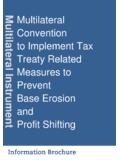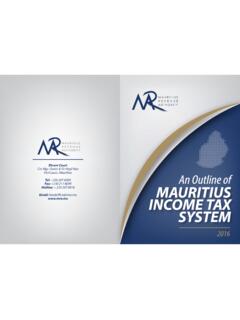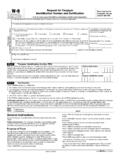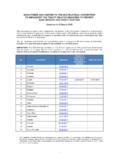Transcription of Canadian withholding tax guide - RBC I&TS
1 Canadian withholding tax guide MARCH 2015 INSINSINS Disclaimer RBC Investor & Treasury Services is a global brand name and is part of Royal Bank of Canada. RBC Investor & Treasury Services is a specialist provider of asset servicing, custody, payments and treasury services for financial and other institutional investors worldwide. RBC Investor & Treasury Services operates primarily through the following companies: Royal Bank of Canada, RBC Investor Services Trust and RBC Investor Services Bank , and their branches and affiliates. In the UK, RBC Investor Services Trust operates through a branch authorized by the Prudential Regulation Authority and regulated by the Financial Conduct Authority and the Prudential Regulation Authority. In Australia, RBC Investor Services Trust is authorized to carry on financial services business by the Australian Securities and Investments Commission under the AFSL (Australian Financial Services Licence) number 295018. In Singapore, RBC Investor Services Trust Singapore Limited (RISTS) is licensed by the Monetary Authority of Singapore (MAS) as a Licensed Trust Company under the Trust Companies Act and was approved by the MAS to act as a trustee of collective investment schemes authorized under S 286 of the Securities and Futures Act (SFA).
2 RISTS is also a Capital Markets Services Licence Holder issued by the MAS under the SFA in connection with its activities of acting as a custodian. In Hong Kong, RBC Investor Services Bank is a restricted license bank and is authorized to carry on certain banking business in Hong Kong by the Hong Kong Monetary Authority. RBC Investor Services Trust Hong Kong Limited is regulated by the Mandatory Provident Fund Schemes Authority as an approved trustee. / Trademarks of Royal Bank of Canada. Used under licence. i | Canadian withholding TAX guide Contents Introduction 2 1. Recent changes 3 Protocol amending Canada - United Kingdom Tax Treaty entered into force 3 CRA releases revised instructions to NR7-R tax reclaim form 3 Tax treaty changes 3 Tax Information Exchange Agreements 4 2. Canadian withholding taxes 5 Introduction 5 CRA documentation requirements 5 Summary of required client actions to obtain reduced rates of withholding tax 6 withholding requirement for underlying Canadian residents 7 Rates of Canadian withholding tax applicable to interest, dividend and trust income 8 Payments to residents of non-treaty countries 8 Payments to residents of treaty countries 8 3.
3 Exemptions from withholding tax 9 Most interest payments made on or after January 1, 2008 9 Exemption under Doctrine of Sovereign Immunity 9 Exemption for certain international organizations 9 Exemption under article XXI of Canada/US tax convention 10 Exemption under certain other treaties for pension or retirement plans 10 4. Refund of excess non-resident tax withheld at source 12 Introduction 12 Refund process for claims during the same calendar year 12 NR7-R process for refund claims to the CRA 12 If NR4 slip HAS been issued to the beneficial owner 12 If NR4 slip has NOT been issued to the beneficial owner: 13 Special Note for NR7-R reclaims by financial institutions resident in Switzerland 13 If refund payment is to be directed to a third party 14 5. Other tax considerations for non-residents 15 Capital gains derived by non-resident investors 15 Non-resident investors in Canadian limited partnerships 15 Non-resident investors in Canadian mutual funds (other than publicly traded funds) 15 Non-resident investors in hybrid assets with US-source income 15 6.
4 Canada Revenue Agency (CRA) Contacts 17 Appendix 1: Treaty rates of Canadian withholding tax 18 Appendix 2: Canada s tax treaties and status of treaty negotiations 23 Appendix 3: Canada s international tax information exchange agreements 24 Appendix 4: Registered ownership affidavit 25 Appendix 5: Beneficial ownership affidavit 26 Appendix 6: Combined affidavit 27 1 | Canadian withholding TAX guide Introduction This March 2015 edition of RBC Investor & Treasury Services (RBC I&TS) Canadian withholding Tax guide is intended primarily for our foreign custodial and financial institution clients for whom we hold Canadian traded securities. We may hold these securities either on behalf of our clients or on behalf of their underlying clients who are non-residents of Canada. The information in this guide is current as of February 27, 2015. This guide provides general information on typical situations involving non-resident investors in publicly-traded securities.
5 It does not provide tax advice. While reasonable care has been taken in the preparation of this guide , RBC I&TS cannot guarantee that the information in this guide is accurate as of the date of writing or that it will continue to be accurate in the future. RBC I&TS recommends you consult with your tax advisors regarding your tax obligations. 2 | Canadian withholding TAX guide 1. Recent changes Since the previous version of this guide was issued, a number of tax changes have occurred that may be of interest to clients who invest in Canadian securities. Protocol amending Canada - United Kingdom Tax Treaty entered into force Among other changes, effective January 1, 2015,Article VI of the protocol reduces the Canadian withholding tax rate from 15% to 0% for dividends paid or credited to a pension plan or scheme (other than a social security scheme) resident in the UK and registered under Part 4 of the Finance Act 2004, including pension funds or pension schemes arranged through insurance companies and unit trusts where the unit holders are exclusively pension schemes.
6 In addition, the UK pension scheme must generally be exempt from tax in the UK, be the beneficial owner of the shares on which the dividends are paid and cannot own directly or indirectly more than 10% of the capital or voting power of the company paying the dividends. The complete text of the protocol is at CRA releases revised instructions to NR7-R tax reclaim form In October 2014, the Canada Revenue Agency (CRA) issued revised instructions to Form NR7-R for reclaiming amounts of Canadian tax withheld. N ow, for tax reclaims on dividend, interest or trust payments, only one NR7-R form need be used per year, per income type, per beneficial owner, per CUSIP number, per Canadian payer or agent s non-resident tax account number. Previously, a separate NR7-R reclaim form was required for each payment. When claiming for more than one payment on a particular security for a year, the supporting information attached to the form should include a listing of the details of the payments and tax withheld.
7 Please see chapter 4 for more details on the reclaim process. Tax treaty changes Since the July 2013 edition of this guide , tax treaties or protocols have been signed or entered into force with the following countries; Austria Barbados Belgium France Hong Kong Luxembourg New Zealand Poland Serbia Spain Switzerland United Kingdom United States (information exchange agreement) 3 | Canadian withholding TAX guide Please refer to Appendix 2 for a table listing all of Canada s tax treaties and the status of treaty negotiations. Tax Information Exchange Agreements Since the July 2013 edition of this guide , Tax Information Exchange Agreements (TIEA) have entered into force with: Bahrain British Virgin Islands Brunei Liechtenstein Panama Uruguay While TIEAs do not affect withholding rates, they provide for the mutual exchange of information between the tax authorities of each jurisdiction. Please refer to Appendix 3 for a table listing Canada s TIEAs and the status of TIEA negotiations.
8 4 | Canadian withholding TAX guide 2. Canadian withholding taxes Introduction The rate of Canadian tax applicable to payments made to non-residents of Canada can vary depending upon factors such as: the type of payment ( , interest, dividends or trust income) the rate of tax applicable to that type of payment under Canadian domestic law whether a tax treaty or convention applies between Canada and the country of residence of the recipient that reduces the rate of tax on that type of payment whether an exemption applies to the particular non-resident recipient and the particular type of income either under Canadian law (such as for payments to certain supranational organizations) or under the terms of the particular tax treaty or convention (such as Article XXI of the Canada US tax treaty) It is therefore critical that you provide RBC I&TS with up-to-date information on the tax residency, eligibility for reduced treaty rates of withholding and any applicable tax exemptions for all accounts owned by non-residents of Canada.
9 In order for RBC I&TS to apply the correct rate of withholding tax for each client situation, clients should complete and submit the applicable Declaration of Tax Residency and Treaty Benefits form for their account(s) depending on their situation (either Agent/Nominee [(Form A]) or, if a Beneficial Owner of your own proprietary assets, CRA Form NR301: Declaration of Eligibility for Benefits Under a Tax Treaty for a Non-resident Taxpayer, as applicable) when requested to do so from time to time, or when there is a change in the residency or treaty or exemption eligibility of the account owner. CRA documentation requirements As detailed in prior versions of this guide , we remind clients that the Canada Revenue Agency (CRA) has increased the level of documentation that Canadian payers and their foreign agents/nominees (collectively called payers ) are expected to have if they grant treaty rates of non-resident withholding tax to their clients. Effective from January 1, 2013, payers must be able to provide up-to-date documentation to establish the beneficial owner s identity, tax country of residence and eligibility for benefits under a treaty between Canada and the residence country.
10 The CRA has released three official forms to allow payers to gather additional information from non-resident beneficial owner payees: Form NR301: Declaration of Eligibility for Benefits Under a Tax Treaty for a Non-resident Taxpayer Form NR302: Declaration of Eligibility for Benefits Under a Tax Treaty for a Partnership with Non-Resident Partners Form NR303: Declaration of Eligibility for Benefits under a Tax Treaty for a Hybrid Entity Important note for partnerships and hybrid entities While the CRA has released the NR302 and NR303 forms for use by non-resident partnerships and hybrid entities, RBC I&TS policy continues unchanged such that we will not provide reduced treaty rates at source on payments to these entities. Rather, we will continue to withhold at the statutory rate of 25% and refunds may be claimed directly from the CRA through the NR7-R process described in section 4 of this guide . It is our understanding that the only hybrid entity currently recognized under a treaty with Canada is a US LLC.






